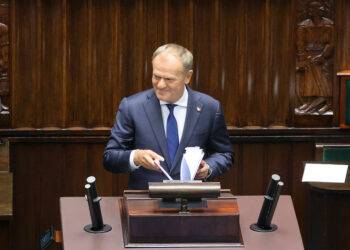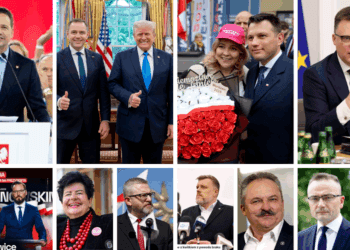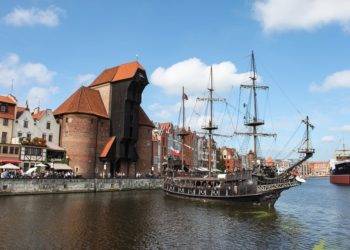With less than a month remaining until Poland’s presidential election, new findings by European disinformation watchdogs have revealed that Russian influence operations are once again attempting to manipulate public discourse in the country. A fresh report by Alliance4Europe, in collaboration with Lithuania-based Debunk.org, has confirmed that the long-running “Operation Doppelganger” disinformation campaign has been refocused on the Polish electorate ahead of the vote scheduled for May 18.
According to the analysts, Russia’s latest information warfare tactics include impersonating Polish media, spreading false narratives about the war in Ukraine, and undermining public trust in the Polish government and NATO. The operation appears to be a continuation of a larger campaign previously deployed against Western countries during critical elections and geopolitical moments.
Sophisticated Tactics with Familiar Targets
Operation Doppelganger was first exposed in 2022 by EU DisinfoLab. It involves the use of fake websites that closely mimic the design and URL structure of legitimate European media outlets. These cloned platforms publish false or distorted content aligned with Kremlin narratives and then distribute it through coordinated social media campaigns using automated bots and inauthentic accounts.
This tactic is designed to create the illusion of legitimate journalism while smuggling in propaganda. Previous Doppelganger targets included France, Germany, and the United States, especially during times of political tension or military engagement involving Ukraine.
The latest iteration targeting Poland includes links to forged versions of leading Polish news platforms, including TVN24, Onet, Interia, and Wprost. Analysts say this allows disinformation actors to exploit the trust readers place in familiar news brands, amplifying the reach and impact of false narratives.
Key Narratives and Electoral Timing
Between March 4 and April 4, 2025, researchers recorded 279 posts on the social media platform X (formerly Twitter) that linked to 13 major Polish media brands. Many of these links led to fake websites rather than the real news portals they imitated.
The content of these fake articles included anti-Ukrainian sentiment, criticism of Western sanctions on Russia, and claims that Poland’s support for Ukraine is harming its economy and international standing. Other articles attacked Polish political figures, including incumbent President Andrzej Duda and candidates running in the upcoming presidential race.
One prominent narrative falsely claimed that Polish troops were being covertly deployed to Ukraine, risking direct conflict with Russia. Another repeated the baseless assertion that Ukrainian refugees are receiving preferential treatment over Polish citizens.
Researchers warn that the timing of these messages is no coincidence. The Polish presidential election is seen as a crucial test for democratic stability in the region, especially amid the ongoing war in Ukraine and rising geopolitical tensions across Europe. Russia’s efforts appear aimed at inflaming political divisions, undermining public trust in government institutions, and reducing electoral turnout.
Coordinated and Multilingual Campaigns
While the primary language of the disinformation posts was Polish, some messages were also found in English and German—indicating that the campaign may also be designed to shape external perceptions of Poland’s political climate and international role.
Disinformation specialists note that the operation’s reach was limited but highly coordinated. In many cases, similar posts appeared across multiple fake accounts within minutes of each other, suggesting the use of automation tools and pre-planned content schedules.
The cloned websites were also created using domain names that closely resembled those of legitimate Polish outlets. Minor changes in spelling or use of alternative domain endings made it difficult for casual readers to distinguish between real and fake sources.
National and European Response
In response to the report, Poland’s Ministry of Digital Affairs reiterated its commitment to cyber and information security, emphasizing that electoral integrity remains a national priority. The Ministry confirmed that it is working with EU partners and independent fact-checkers to monitor and counter disinformation campaigns.
“The Polish government takes this issue seriously. We are coordinating with European institutions and media organizations to ensure that citizens receive accurate information, especially in the lead-up to the election,” a ministry spokesperson said.
Meanwhile, the European External Action Service (EEAS) also issued a statement condemning Russia’s continued use of information operations to interfere in democratic processes within EU member states.
The Role of Media Literacy
Experts argue that the most effective defense against such operations is a combination of technical safeguards and increased public awareness. Krzysztof Izdebski, a legal and digital governance expert with the Batory Foundation, emphasized the importance of teaching media literacy at all levels of education.
“Recognizing disinformation is not just a matter of technology—it’s about critical thinking,” Izdebski said. “We need to equip citizens with the tools to question what they see and read, especially when political stakes are high.”
Debunk.org and other fact-checking organizations have launched educational campaigns to help voters identify fake sites and verify sources. They recommend double-checking URLs, comparing articles with those on official platforms, and reporting suspicious content to trusted watchdogs.
As Poland heads into a pivotal presidential election, the resurgence of Operation Doppelganger is a stark reminder of the evolving nature of foreign interference. While the scope of the campaign remains relatively contained, its intent is clear: to destabilize the information environment and weaken democratic institutions. Vigilance, transparency, and cooperation between civil society, media, and government will be essential to ensure that the Polish public can vote free from foreign manipulation.

















